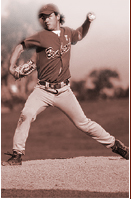 |
|
|
First Base – Albert Pujols, St. Louis What’s left to say? Four Fielding Bible Awards in four years. When Pujols first came up I envisioned him as what Miguel Cabrera is now: a great hitter struggling to find a position he can play well defensively. Albert played left field (not so well). He played right field (not so well). He played third base (not so well). Then he discovered first base and has been the best in baseball, both offensively and defensively, ever since. Second Base – Aaron Hill, Toronto It’s the second Fielding Bible Award for Hill (he won the 2007 award), and it didn’t come easily. The regular voting by the panel ended in a tie between Hill and Dustin Pedroia at 76 points with Chase Utley just three behind. For the second time in the history of the award, we went to the tie-breaker. The first tie-breaker rule is based on the player with the most first-place votes. Hill wins because he had four first-place votes from our ten panelists to only one for Pedroia. Third Base – Ryan Zimmerman, Washington Third base is a very strong, deep defensive poistion in baseball right now. I would be comfortable with any of the top nine guys in our voting winning The Fielding Bible Award—or the Gold Glove award, for that matter—this year. Ryan Zimmerman has broken out of the pack in my estimation, however, by becoming the Defensive Runs Saved leader at third base over the last three years. His first Fielding Bible Award is well deserved. The rest of the best: Adrian Beltre, Chone Figgins, Evan Longoria, Scott Rolen, Brandon Inge, Pedro Feliz, Jack Hannahan and Joe Crede. Shortstop – Jack Wilson, Pittsburgh and Seattle Wilson won’t win a Gold Glove this year. Just like Mark Teixeira didn’t win one last year. He split time between leagues, and the Gold Glove voters don’t know which league to put him in. Not so with The Fielding Bible Awards. Jack Wilson was the best shortstop in baseball last year. Period. We don’t care which league he played in. He led all shortstops in Run Saved by a wide margin (27 runs saved to Brendan Ryan’s 19) and has taken over the MLB lead for most Runs Saved over the last three years (51). Mr. Wilson is the Fielding Bible Award winner at shortstop for 2009. Left Field – Carl Crawford, Tampa Bay He’s baaack! Again. Crawford wins his third award. The only year of our four that he didn’t win was two years ago (2007), when he came in a close second to Eric Byrnes. This year was no contest. No player has ever won with a perfect record (10 first place votes from 10 panelists), but Carl came as close as possible with nine first places and one second. That’s 99 points. (The best previously was 98 points by Adam Everett at shortstop in 2006.) If Crawford doesn’t win his first Gold Glove this year, I’m going to throw up. Center Field – Franklin Gutierrez, Seattle What a story. Gutierrez excelled defensively for two years playing right field for Cleveland. He led all right-fielders in plus/minus in each of 2007 and 2008, despite playing less than 100 games each year. Seattle put a huge emphasis on defense in 2009, and Franklin came through for them with another Fielding Bible Award, this time in center field. His 31 runs saved tied him with Chone Figgins for the most in baseball last year. For outfielders, Carl Crawford’s 23 runs saved was second best to Gutierrez. The Seattle Mariners finished the 2009 season as the best defensive team in baseball, with 109 runs saved as a team. Right Field – Ichiro Suzuki, Seattle Ichiro was no small part of Seattle’s defensive success as well. He saved 11 runs defensively, and our voters rewarded him with his second Fielding Bible Award. His first was in 2006. Hunter Pence gave him a run for his money, however, as Ichiro finished with 93 points to Hunter’s 84. Suzuki was named first on five ballots to three for Pence. Catcher – Yadier Molina, St. Louis Yadier was the third “most popular” vote getter in 2009. He was named first on eight ballots, finishing with 96 points. Everyone knows about Molina’s incredible throwing arm. Well, maybe not the eight guys he picked off this year (the most by any catcher—next most was four). But one thing that hasn’t been measured until recently is a catcher’s ability to prevent bad pitches from getting past him, allowing baserunners to move up. We measured this stat this year and shared it with our voters. No surprise, Yadier is one of the best. Pitcher – Mark Buehrle, Chicago In The Fielding Bible—Volume II, we put some extra time into analyzing pitcher defense. It’s not only pitchers’ ability to field their position that counts defensively. It’s their ability to hold runners that matters in an important way as well. In Buehrle’s case, he has it all. His plus/minus figure of +9 was tops among pitchers in 2009, but his ability to hold runners is legendary. In the last four years he’s allowed a total of 15 stolen bases. His catchers have managed to catch five potential thieves in that time period. But even more importantly, when Mark throws over to first, the results are devastating for baserunners. Sixteen times in those same four years, he’s thrown over to first and the runner broke for second and was thrown out. That’s a Pitcher Caught Stealing (PCS) in our scorebook. Not only that, 14 more times Buehrle nabbed a baserunner at the base as he tried to get back. That’s a Pitcher Pickoff (PPO), for those of you scoring at home. In total, 15 stolen bases against him (an average of just under four per year) and 35 guys thrown out (an average of almost nine per year). Not too shabby.  |
|
 | |
